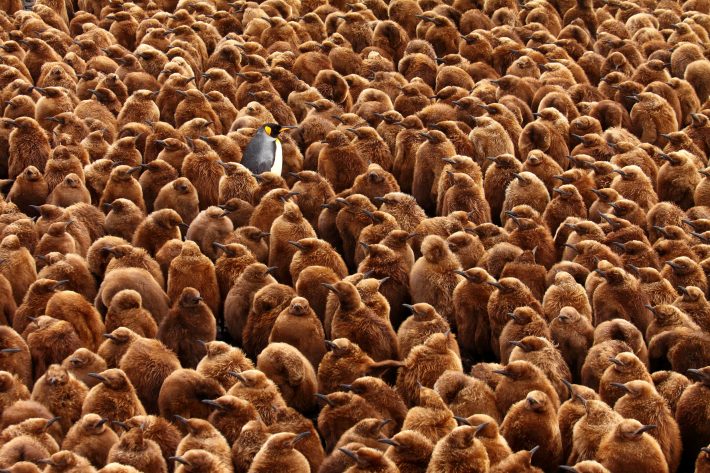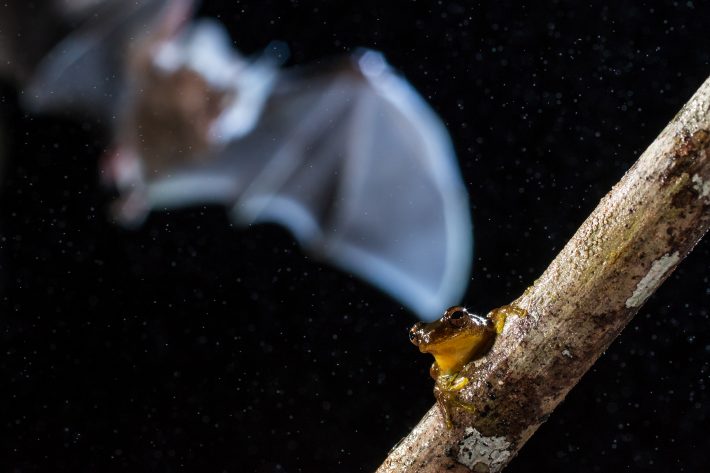Capturing Ecology – Winning images of British Ecological Society competition announced
We have revealed the winners of our annual photography competition ‘Capturing Ecology’. With images taken by international ecologists and students, this competition celebrates the diversity of ecology.

Capturing flora and fauna from across the planet, subjects range from African wild dog research to an artistic take on Galapagos iguanas to images exploring the relationships between people and nature.
The overall winner is Chris Oosthuizen, from the University of Pretoria, with his image of a lone adult king penguin standing amongst a crowd of chicks on sub-Antarctic Marion Island (part of the Prince Edward Islands).
“Although the global population of king penguins is large, populations inhabiting islands around the Antarctic face an uncertain future. Global climate change may shift the oceanic fronts where they feed further away from breeding sites, forcing penguins to travel farther to reach their foraging grounds”, said Oosthuizen of his winning image, which was taken while spending a year on this remote island conducting research on seals and killer whales.
Professor Richard Bardgett, President of the BES, commented: “Some images have the power to say much more than words, and Chris’s image, which showcases the remarkable colony life of an iconic bird species, raises awareness of their uncertain future due to climate change.”
Oosthuizen also won the ‘Dynamic Ecosystems’ category with an image of a southern giant petrel preying on a king penguin chick.
The overall student winner is Adrià López Baucells, who is studying the consequences of Amazonian rainforest fragmentation on insectivorous bats as part of his PhD project at the University of Lisbon. Using a motion sensor and four flashes synchronised with the camera, Lopez-Baucells and colleague Oriol Massana managed to capture for the first time a fringe-lipped bat sneaking up on a little yellow frog of the genus Scinax.
“The high standard of submissions this year made selecting winners a big challenge. Some entries captured fleeting and intimate insights into animals’ lives, which requires technical prowess and patience to achieve. We congratulate all winners and thank all the participants for their submissions”, concluded Bardgett.
With the support of publishing partner Wiley, the winning images will be exhibited at the Society’s annual conference in Birmingham next month, which will bring together 1,200 ecologists from more than 40 countries to discuss the latest research. They will also be displayed at a free public exhibition in London, running from 21-27 January 2019.
The independent judging panel included six eminent ecologists and award-winning wildlife photographers.

Full list of winners:
Overall winner: Chris Oosthuizen, University of Pretoria, Stand out from the crowd, adult king penguin amongst chicks
Overall runners-up:
Peter J Hudson, Penn State University, Pollination!, a bat feeding on nectar of agave plants in the Sonoran Desert of Arizona
Roberto García-Roa, University of Valencia, Living fossil, a Sahara sand viper in Morocco
Overall student winner: Adrià López Baucells, University of Lisbon, Shadows in the sky, a fringe-lipped bat sneaking up on a little yellow frog
Category 1 – Up Close and Personal
An image displaying the intricacy of nature using close-up or macro photography.
Winner: Roberto García-Roa, University of Valencia, Web of life, a spider in Spain
Student winner: Alex Edwards, University of Plymouth, Look into my eyes, a powdered glass frog in Costa Rica
Category 2 – Dynamic Ecosystems
Demonstrating interactions between different species within an ecosystem.
Winner: Chris Oosthuizen, University of Pretoria, Stinkpot special: Penguin a la King, A southern giant petrel preys on a young king penguin chick
Student winner: Sandra Angers-Blondin, University of Edinburgh, Fox on the hunt, a red fox in the Canadian Arctic
Category 3 – Individuals and Populations
A unique look at a species in its environment, either alone or as part of a population.
Winner: Adrià López Baucells, University of Lisbon, Flying in the rain, a Seba’s short-tailed bat in the Brazilian Amazon rainforest
Student winner: Adrià López Baucells, University of Lisbon, Climbing in the tropics, an anteater in the Brazilian Amazon rainforest
Category 4 – People and Nature
An interesting and original take on the relationships between people and nature.
Winner: Nibedita Mukherjee, University of Exeter, Man in mangrove, Kerala in India
Student winner: Lydia Gibson, UCL, Birds of a feather, Greater Antilles in the Caribbean
Category 5 – Ecology in Action
Showcasing the practice of ecology in action
Winner: Dominik Behr, University of Zurich and Botswana Predator Conservation Trust, The tables have turned, a wild dog pup playing with a tranquiliser dart
Student winner: Ella Cooke, BSc Ecology and Conservation, UV beetle tracking, experiment with ultraviolet powder and torches
Category 6 – The Art of Ecology
A creative and original take on photography denoting ecology
Winner: Mark Tatchell, retired ecologist, Marine iguanas warm up, Galapagos Islands
Student winner: Mathilde Le Moullec, Norwegian University of Science and Technology,
Can you feel the harsh climate of the high Arctic?, Svalbard in Norway
Media contact:
Sabrina Weiss, Press Officer, British Ecological Society, Tel: +44 207 685 2523, Email: sabrina@britishecologicalsociety.org
Like what we stand for?
Support our mission and help develop the next generation of ecologists by donating to the British Ecological Society.